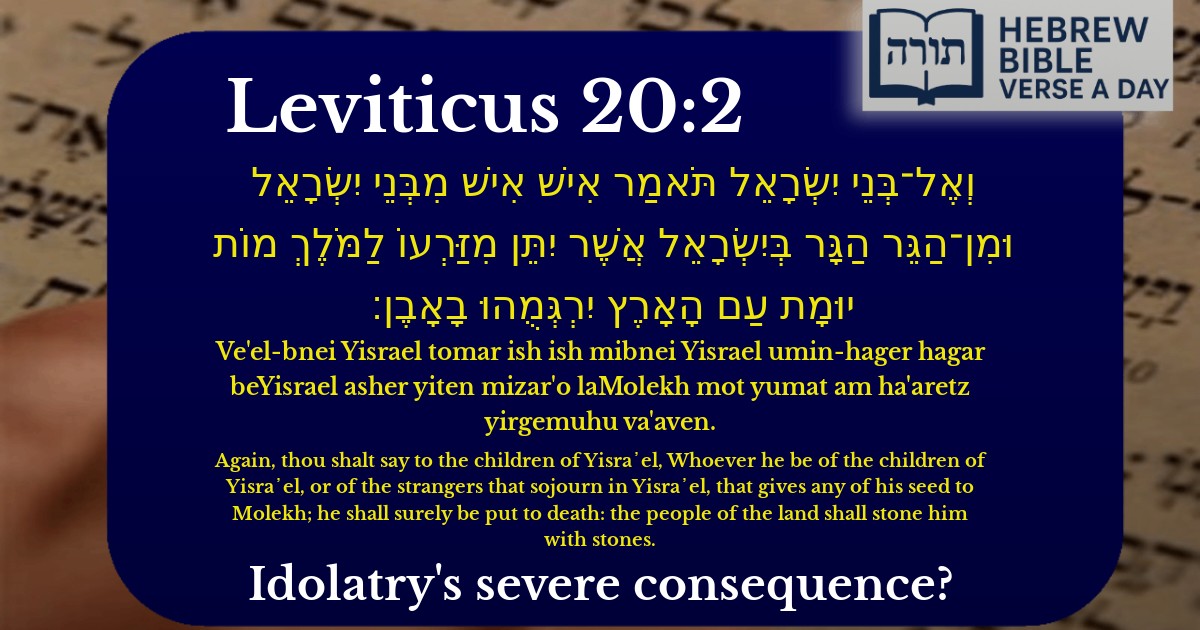Join Our Newsletter To Be Informed When New Videos Are Posted
Join the thousands of fellow Studends who rely on our videos to learn how to read the bible in Hebrew for free!
Hebrew Text
וְאֶל־בְּנֵי יִשְׂרָאֵל תֹּאמַר אִישׁ אִישׁ מִבְּנֵי יִשְׂרָאֵל וּמִן־הַגֵּר הַגָּר בְּיִשְׂרָאֵל אֲשֶׁר יִתֵּן מִזַּרְעוֹ לַמֹּלֶךְ מוֹת יוּמָת עַם הָאָרֶץ יִרְגְּמֻהוּ בָאָבֶן׃
English Translation
Again, thou shalt say to the children of Yisra᾽el, Whoever he be of the children of Yisra᾽el, or of the strangers that sojourn in Yisra᾽el, that gives any of his seed to Molekh; he shall surely be put to death: the people of the land shall stone him with stones.
Transliteration
Ve'el-bnei Yisrael tomar ish ish mibnei Yisrael umin-hager hagar beYisrael asher yiten mizar'o laMolekh mot yumat am ha'aretz yirgemuhu va'aven.
Hebrew Leining Text
וְאֶל־בְּנֵ֣י יִשְׂרָאֵל֮ תֹּאמַר֒ אִ֣ישׁ אִישׁ֩ מִבְּנֵ֨י יִשְׂרָאֵ֜ל וּמִן־הַגֵּ֣ר <b>׀</b> הַגָּ֣ר בְּיִשְׂרָאֵ֗ל אֲשֶׁ֨ר יִתֵּ֧ן מִזַּרְע֛וֹ לַמֹּ֖לֶךְ מ֣וֹת יוּמָ֑ת עַ֥ם הָאָ֖רֶץ יִרְגְּמֻ֥הוּ בָאָֽבֶן׃
וְאֶל־בְּנֵ֣י יִשְׂרָאֵל֮ תֹּאמַר֒ אִ֣ישׁ אִישׁ֩ מִבְּנֵ֨י יִשְׂרָאֵ֜ל וּמִן־הַגֵּ֣ר ׀ הַגָּ֣ר בְּיִשְׂרָאֵ֗ל אֲשֶׁ֨ר יִתֵּ֧ן מִזַּרְע֛וֹ לַמֹּ֖לֶךְ מ֣וֹת יוּמָ֑ת עַ֥ם הָאָ֖רֶץ יִרְגְּמֻ֥הוּ בָאָֽבֶן׃
🎵 Listen to leining
Parasha Commentary
📚 Talmud Citations
This verse is quoted in the Talmud.
📖 Sanhedrin 64a
The verse is discussed in the context of the prohibition against giving one's offspring to Molech, detailing the severity of the sin and the punishment.
📖 Megillah 25a
The verse is referenced in a discussion about the public reading of certain Torah portions that include severe prohibitions, such as the one against Molech worship.


Prohibition of Child Sacrifice to Molekh
The verse (Vayikra 20:2) prohibits the abhorrent practice of giving one's offspring to Molekh, a pagan deity associated with child sacrifice. The Torah mandates the death penalty for this transgression, to be carried out by stoning (skilah). Rashi explains that Molekh worship involved passing a child through fire as an offering, a practice utterly antithetical to Jewish values of sanctity of life.
Inclusion of Strangers (Gerim)
The verse explicitly includes "the stranger that sojourns in Israel" in this prohibition. Rambam (Hilchos Avodah Zarah 5:3) derives from this that the prohibition applies equally to Jews and resident aliens (ger toshav), demonstrating that certain fundamental moral laws are binding upon all inhabitants of the land.
Severity of the Transgression
The Talmud (Sanhedrin 64a) discusses this prohibition at length, noting its exceptional severity:
Spiritual Significance
The Sforno explains that this prohibition represents a complete rejection of idolatrous worldviews that devalue human life. By contrast, Judaism teaches that children are a sacred trust from Hashem. The Midrash (Toras Kohanim) connects this to the idea that one who gives their child to Molekh effectively denies Hashem's sovereignty.
Contemporary Application
While the specific practice of Molekh worship no longer exists, Chazon Ish (Yoreh De'ah 116:6) notes that the underlying principles remain relevant - prohibiting any form of child endangerment or abuse that might parallel this ancient transgression against the sanctity of life.